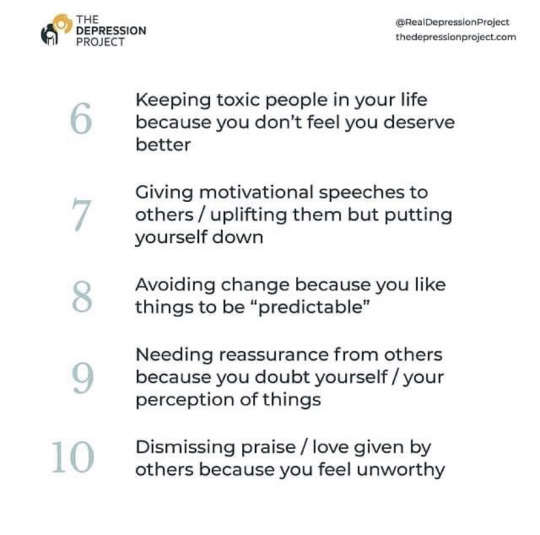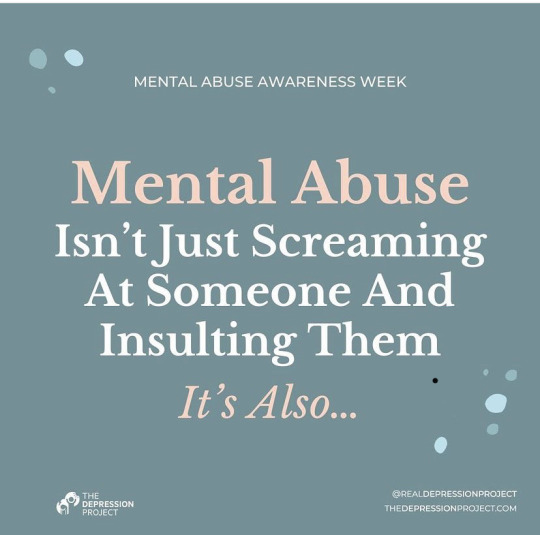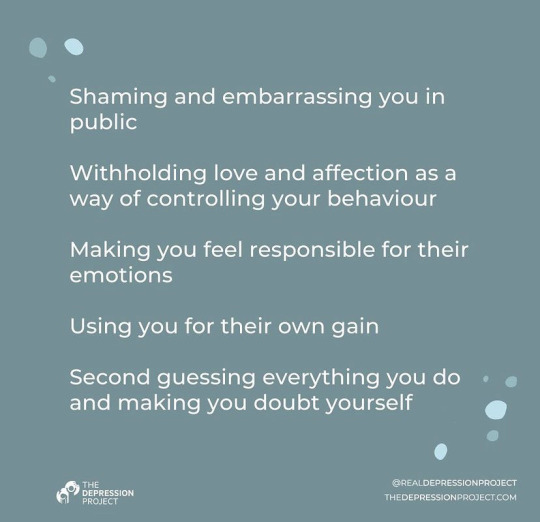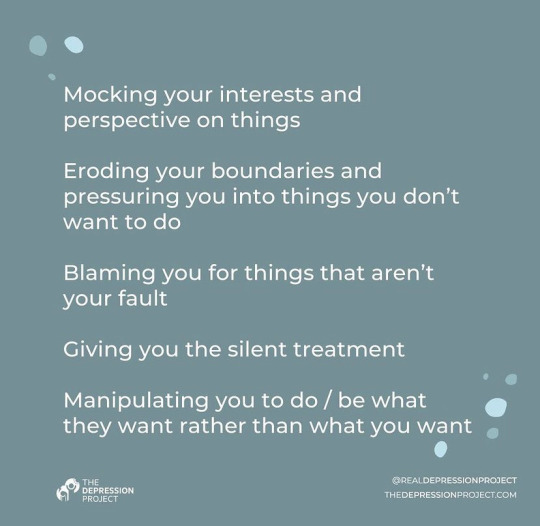Don't wanna be here? Send us removal request.
Text
my grass is greener
So, there is this woman that lives right across from my house. Her boyfriend is older than us, and knows my man's father. My man goes over there sometimes and talks to him about whatever men talk about, and she's always there. Well, now she has started only knocking on our door when my man is home and wanting to talk to him. Or, she will come in and talk our ears off for a few minutes then leave. It's never both of them over, ever. But she comes by a lot more. She is always sticking her head out her window as soon as my man gets home from work and just has to talk to him. Well, I recently found out her boyfriend doesn't want to have sex with her because she's gained a lot of weight. So, I feel she is trying to get attention from my man because she knows I don't like her because she disrespected me. So I ignore her when she tries to talk to me. I said something to my man about it last night and he said I have nothing to worry about, which I know he would never cheat on me but I don't want him entertaining her bullshit. This woman has called me a bitch and so I ignore her but the fact he is still friends with them just pisses me off. They aren't his friends.
1 note
·
View note
Text
More About Dealing with Anger
How to Know When Anger is Getting Out of Control
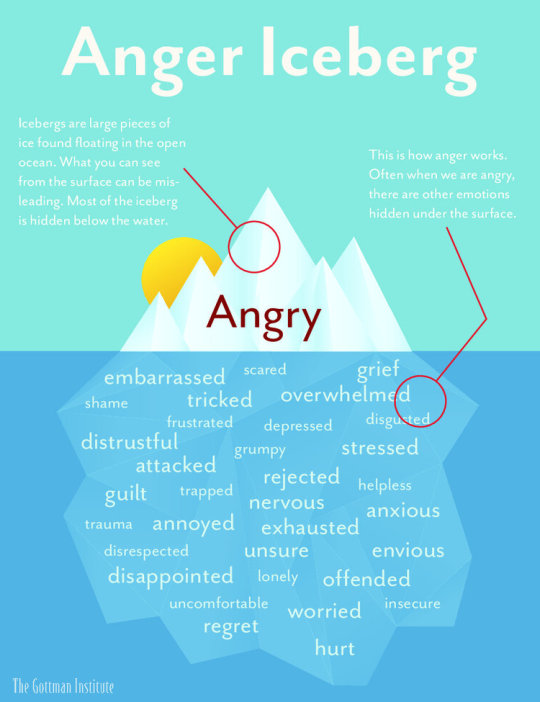
Anger becomes a problem when it starts to harm you or the people around you.
Signs of anger problems include when:
You find it difficult to avoid expressing anger through unhealthy, unhelpful or destructive behavior such as: - Verbal anger: aggressive shouting, swearing, threats, or name-calling - Physical anger: violence and lashing out, hitting or pushing others, breaking things, punching objects to feel a sense of release - Non-violent or passive anger: ignoring people, sulking, refusing to do tasks or doing them deliberately poorly - Inward anger: hiding your anger, harming yourself, denying yourself your basic needs, saying you hate yourself,
Your anger has a negative impact on your mental and physical health
Anger becomes your go-to emotion, blocking out other feelings
You react quickly and violently to minor issues
You wrongly accuse friends and relatives of disrespecting or lying to you
You consistently have the same arguments with people when reacting to similar triggers each time, without finding new ways to deal with these feelings of anger
You feeling frustrated with your actions during an argument or regretting them instantly after the event
You struggle to compromise or arrive easily at mutual agreements without getting angry
You have problems with expressing emotions in a calm and healthy way
Cycles of bad behaviour may be affecting relationships
Symptoms of An Anger Problem:
Depression, anxiety, paranoia, frustration, lack of sleep, social isolation, headaches, increased blood pressure, heart palpitations, tightened or anxious feelings in the chest area, blushing, sweating, fatigue, substance abuse or addiction.
Anger Management Tips
First, recognize the signs of anger:
heart is beating faster
breathing is quicker
feet are tapping
you're clenching your jaw or fists
a churning feeling in your stomach
tightness in your chest
legs go weak
tense muscles
you feel hot
you have an urge to go to the toilet
sweating, especially your palms
a pounding head
shaking or trembling
dizziness
feeling tense, nervous or unable to relax
feeling guilty
feeling resentful towards other people or situations
you are easily irritated
feeling humiliated
Then, buy yourself some time:
Count to 10 before you react. Take a few moments to collect your thoughts before saying anything you’ll regret— and allow others involved in the situation to do the same. As soon as you're thinking clearly, express your frustration in an assertive but non confrontational way.
Take a timeout. Take yourself out of the situation by going for a short walk – even if it's just around your block or local area.
Talk to a trusted person who's not connected to the situation, such as a friend, family member, counsellor or peer support group. If you don't feel comfortable talking to someone you know, you can confidentially call the Samaritans 24 hours a day to talk about anything that's upsetting you.
Techniques to Manage your Anger feelings:
Breathe slowly – try to breathe out for longer than you breathe in and focus on each breath as you take it.
Relax your body – if you can feel your body getting tense, try focusing on each part of your body in turn to tense and then relax your muscles.
Try mindfulness techniques – mindfulness can help you to be aware of when you're getting angry and can help calm your body and mind down.
Exercise – try to work off your anger through exercise. Sports like running or boxing can be really helpful for releasing pent up energy.
Use up your energy safely in other ways – this can help relieve some of your angry feelings in a way that doesn't hurt yourself or others. For example, you could try tearing up a newspaper, hitting a pillow or smashing ice cubes in a sink.
Do something to distract yourself mentally or physically – anything that completely changes your situation, thoughts or patterns can help stop your anger escalating. See our positive outlets below.
Identify possible solutions: Instead of focusing on what made you mad, work on resolving the issue at hand. Remind yourself that anger won't fix anything and might only make it worse.
Stick with 'I' statements: To avoid criticizing or placing blame — which might only increase tension — use "I" statements to describe the problem. For example, say, "I'm upset that you left the table without offering to help with the dishes" instead of "You never do any housework."
Don't hold a grudge: If you allow anger and other negative feelings to crowd out positive feelings, you might find yourself swallowed up by your own bitterness or sense of injustice. But if you can forgive someone who angered you, you might both learn from the situation and strengthen your relationship.
Use humor to release tension: Lightening up can help diffuse tension. Use humor to help you face what's making you angry and, possibly, any unrealistic expectations you have for how things should go. Avoid sarcasm, though — it can hurt feelings and make things worse.
Know when to seek help: Seek help for anger issues if your anger seems out of control, causes you to do things you regret or hurts those around you. - Anger management classes allow you to meet others coping with the same struggles and learn tips and techniques for managing your anger. - Therapy, either group or individual, can be a great way to explore the reasons behind your anger and identify triggers. Therapy can also provide a safe place to practice new skills for expressing anger.
Managing Anger in the Long Term
Explore what’s really behind your anger: is your anger masking other feelings such as embarrassment, hurt, insecurity, shame or vulnerability? Is it stemming from what you learned as a child? Is it a symptom of an underlying health problem such as depression, anxiety, trauma or chronic stress?
Identify your triggers: Look at your regular routine and try to identify activities, times of day, people, places, or situations that trigger irritable or angry feelings. When you identify your triggers, think about ways to either avoid them or view the situations differently so they don’t make your blood boil.
Negative thought processes that can trigger anger: anger doesn’t always stem directly from external factors. It is caused by how you react to and think about what happens in these instances. Here are common negative thought patterns that can trigger and fuel anger: - Overgeneralizing: For example, using phrases like “He ALWAYS interrupts me” and “NEVER is on time” or “EVERYONE disrespects me. - Obsessing over “shoulds” and “musts”: having a rigid view/structure of the way things should or must go cultivates anger when reality doesn’t line up. - Mind reading and jumping to conclusions: Assuming you “know” what someone else is thinking or feeling—that they intentionally upset you, ignored your wishes, or disrespected you. - Collecting straws: Looking for small things to get upset about, usually while overlooking or blowing past anything positive, and letting these small irritations build and build until you reach the “final straw” and explode, often over something relatively minor. - Blaming. When anything bad happens or something goes wrong, it’s always someone else’s fault. You tell yourself, “life’s not fair,” or blame others for your problems rather than taking responsibility for your own life.
Take care of yourself: taking care of your physical and mental health and wellbeing can help ease tension and diffuse anger problems - Manage stress - Talk to someone you trust - Get enough sleep - Exercise regularly - Be smart about alcohol and drugs
Treatment and Support: Talking Therapy and Counseling - Talk to your doctor or PCP about finding a trained professional (a counselor or psychotherapist) to talking about your problems with
77 notes
·
View notes
Text
723
I think what really makes me upset is he used to be in love with her.
Wrote her love letters and promised one day they would be together.
She's a fucking asshole to me. That's no one that I want to consider is part of his family. Sees his son any time she wants. Just weird. Guess that's what rich people do though.
I can't understand it because that's nothing I have ever had. I think the only person I would consider is close to my family is Adrienne's dad. That man would kill someone over me. I just found out he went to my best friend's house while I was in the hospital (that's going to be a novel in itself) and let Adrienne play with her kids. That meant so much to me for both of them to come together for Adrienne while she missed me. I found out my aunt reached out to D too. It just means a lot.
I know that's what best friends do. They are always there, their family is your family.. all that. I know deep down she's probably in love with him too. She apparently thinks she's the only one that will be there forever. No, you haven't met me yet. I'm not temporary. I'm the only woman that changed him for the better. He brags to everyone about me. You had the boy, I have the man. Any best friend that disrespects your relationship or your woman isn't your best friend.
0 notes
Text
722
Now the ones that know are saying please don't stay with him.
"He put his hands on you!"
I will survive...
0 notes
Text
#CatfishMTV
Catfish on MTV is actually a great portrayal of mental illness.
People who talk to a stranger online, and get catfished.
People who are so desperate to love themselves, and give their whole heart to someone so trusting and seems too good to be true.
People who all have some sort of idea of what endings are.
People who are used to losing.
It is all about mental health.
Good job MTV.
0 notes
Text
720
I think about it, and I look at it from a different perspective. Eventually, we will figure it out. Abuse is abuse, yes.
Do I have abusive traits? Yes.
Am I always perfect? No.
I actually see what has happened as a bit of my karma. I don't like what has happened, but I don't give it so much power over me anymore. And that is okay too. Even if I was still where I was, I would still be right - no, this is not normal. But have you based your own understanding about it on your own? That's great. Either way, I am fucking proud of myself. Either way, I still love him. Either way, I am still in control of my body. Either way, I will forgive myself. Either way, I am not afraid and I am not ashamed.
We will get through this like everything else.
And fuck that bitch that thinks she's relevant to Mark. Bitch you can't even fight.
0 notes
Text
Subtle signs of long-term psychological abuse:
Intrusive belief that you have to do everything perfectly and flawlessly or you are no good, deep drop in self-esteem upon making a smallest mistake or being criticized, feeling that your value is tied completely to how well you can finish tasks, perfectionism
Low self-esteem, feeling you’re less smart, less capable, less valuable or less lovable than the people around you; struggling to feel like you’re an equal part of something, worry that people don’t find your worth keeping around, always worrying about being left behind
Over-taking responsibility for everything, bending backwards to make things go well for everyone, feeling guilty and ashamed if something goes wrong that wasn’t in your control, always taking tasks other people wouldn’t do, doing anything to feel useful
Making excuses for other people when they hurt you, always being ready to ‘look at it from their side’ and assume they had a good reason to hurt you, or didn’t mean it, or didn’t realize they were doing it, or were 'just lashing out’ and doing it because of their own pain – but you’d never make those excuses for yourself, or forgive yourself if you did that
Double standards for yourself and others, you feel it’s okay for others to be selfish, unreasonable, short-tempered, assholes, hurtful, impatient, self-centered, but it’s not okay for you to be any of that, judging yourself way more harshly than others
Constant fear of abandonment from your friends and loved ones, fear that you won’t be able to go on if you’re rejected and abandoned by them, over-pleasing them in fear they’ll leave
Feeling there’s something deeply wrong about you, always looking for a way to blame yourself for anything that went wrong, feeling cursed, impostor syndrome
Inclination to hide as much as possible about yourself, only showing an image to people you socialize with, fear that if anyone knew the 'real you’ they would be repulsed and grossed out
Shame for feeling pain, shame for crying, feeling weak and despicable for being vulnerable and hurt, urge to hide and isolate whenever you’re in pain, feeling others would hate you for it
Constant pressure to prove yourself, never feeling like you’re 'good enough’, rarely or never feeling happy or proud of yourself, every day is a battle to show that you’re still worth something
Feeling you have to be always open to scrutiny and criticism, even if it comes from people who don’t know you and don’t wish you well
Arranging your life only to please others, acting a role of support or a servant in other people’s lives, feeling selfish if you try to think of what would be best for you
Worrying that every nice thing anyone has said about you was out of politeness, and every horrible thing someone said about you is secretly true; inability to hold a consistent self image that isn’t affected by everyone’s view of you, imagining that others are thinking the worst of you
Spiraling into feelings of not wanting to exist anymore, wishing you weren’t born, not being able to find anything good about yourself, seeing yourself as a stack of flaws and past mistakes
6K notes
·
View notes
Text
717
One thing I have realized about myself is I always attract emotionally unavailable men.
Men that need healing from me, but they refuse to heal me too.
They take until there is nothing left to give except resentment.
"If I can't have you no one will" is not a wedding vow.
You. Are. Abusive.
I am not your rag doll to throw around and choke when you don't get your way.
You will never disrespect my body again.
1 note
·
View note


